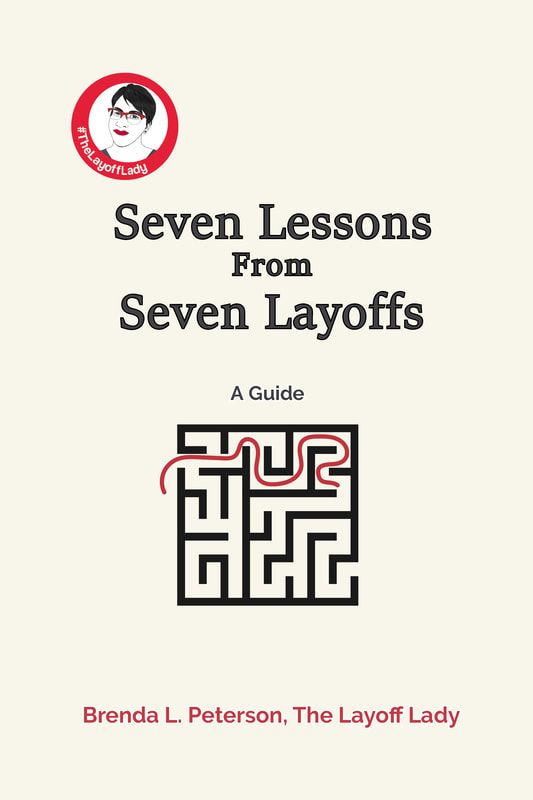|
By Brenda L. Peterson, The Layoff Lady What You WantIn a previous article, we discussed the value of knowing what you want, what you don’t want, and what would be okay. As your job search continues, you may adjust what you want as your job search progresses. Main Factors To ConsiderWhen you put together your target job, it is just that: your target. As you compare your target to the job market, you will need to revisit your job priorities. Know that one factor that may influence the type of job you take will be your time in the job market. Your Acceptable Job May Change Over TimeHere is how your job wants and needs may change over time:
You Can Also Stay the CourseConversely, you may be committed to find a job that very closely aligns with your target job. The good news is that you get to decide what role is right for you, and what will make you happy longer term. The bad news is that it may take you longer if you have very specific requirements and less flexibility. In this case, make sure that you think through options for interim income so you are able to support yourself as you find a role that meets your requirements. Learn More
0 Comments
By Brenda L. Peterson, The Layoff Lady Your Salary RequirementsMost of us work so we can pay for our lives. When you are job searching, it’s important to determine your target salary range to make your job search more effective. Having this information will help you prioritize which jobs to apply for and help you have those early salary conversations. Let’s look at a few strategies for answering the question, “What are your salary requirements?” Start With Your Target RolesFirst, ensure you’ve done the requisite amount of soul-searching to determine what you want to be next in your career. Have a list of what you want to do, possible job titles, relevant skills, core responsibilities, daily activities, focus areas, types of companies, and industries. Having these details on your desired job will help as you start to do salary research. The DisclaimerWhile I feel comfortable discussing various financial and insurance concepts, I do not currently hold a license or any certification that deems me inherently qualified to give financial advice. The information provided here is intended to be used for educational purposes only. Sometimes, the core challenge is knowing how a system generally works, the terms used to describe what you’re asking about, and where to go for additional help. My goal for this article is to share information to guide you as you navigate the murky waters of job searching. I hope my personal experiences can help you cut a path through the wilderness as you try to figure out your next steps. Feel free to take my recommendations or not. Whatever you do, double-check my facts--and everyone's purported facts, for that matter. This is your life, and you will care more about your financial and healthcare decisions than anyone else. Use this information as a starting point for further research as you ultimately decide what’s right for you. Identify Your PrioritiesNow that you understand your target job and what that looks like, think about what you value in a job. For example, some may prioritize having a specific job title, receiving tuition reimbursement money to earn their next credential, and opportunities for a promotion within the company. Another person may prioritize having interesting work while also having schedule flexibility, the ability to work remotely most days, and low health insurance premiums. Still another person may prioritize alongside colleagues in an office, having the opportunity to mentor new employees, and finding a job they can keep for the next 20 years. Think about what is the most important to you. In addition, think about what you value in an employer. Working for a non-profit, government entity, start-up, family business, or Fortune 500 company will have salary, benefit, job security, and total compensation-related implications. Overall, think about what matters to you, and be aware of the salaries that align with your overall job preferences. Factors That Influence Your Target Salary RangeWhen considering your salary requirements, I suggest using a range instead of one specific number. Let’s look at strategies for determining your target salary range. Here are numbers you might have in mind that could impact your range:
I suggest the salary range you share with potential employers includes the lower number that is the minum salary you would happily accept and the maximum number is what you'd be really excited about. What Companies Are PayingKnowing what companies are paying for what you do should also factor in to your target salary range. Here are a few strategies for finding out more: Search For Openings in Pay Transparency StatesTake these steps to find out what open positions are paying:
Research Your Job Title and Geographic LocationMany websites have salary information. Two that come highly recommended by recruiters are Salary.com and Payscale.com. In fact, Salary.com has a Know Your Worth calculator where you can add details like your job title, location, education level, and years of experience and see the impact each factor has on your potential market value. Ask AroundFind out from other job searchers, recruiters, and hiring managers what salaries companies are paying for specific roles. You can also inquire with professional development organizations to see if there are industry or job-specific studies available that include salary-related information. Confounding FactorsHere are a few factors that might make this process challenging:
Learn More
By Brenda L. Peterson, The Layoff Lady Contract vs Benefits Eligible RolesWhen you're looking for work, it's important to know what salary range you have in mind. As you are initially searching for jobs, a key factor in deciding which jobs to pursue and which to pass on will be what you will earn. If you are looking at contract positions, the salary you will receive is the same as your base salary. Usually, you are paid a set amount for each hour worked with no additional benefits. Consequently, contract positions often have a higher hourly rate knowing that each contractor will have to cover their health insurance and other additional benefits that may be included in other job offers. However, If you are in a benefits-eligible role, you will receive additional value above and beyond your base salary rate. Let's consider what factors may be included in your total compensation package. A DisclaimerWhile I feel comfortable discussing various financial and insurance concepts, I do not currently hold a license or any certification that deems me inherently qualified to give financial advice. The information provided here is intended to be used for educational purposes only. Sometimes, the core challenge is knowing how a system generally works, the terms used to describe what you’re asking about, and where to go for additional help. My goal for this article is to share information to guide you as you navigate the murky waters of job searching. I hope my personal experiences can help you cut a path through the wilderness as you try to figure out your next steps. Feel free to take my recommendations or not. Whatever you do, double-check my facts--and everyone's purported facts, for that matter. This is your life, and you will care more about your financial and healthcare decisions than anyone else. Use this information as a starting point for further research as you ultimately decide what’s right for you. Your Work IncomeFirst, let’s look at a high-level, generalized overview of the money you may receive:
Employer Money For A Specific PurposeIn addition to receiving money in the form of a check or payment payable to you, you may also receive money earmarked for a specific purpose.
Benefits, At Least Partially Employer PaidIn the United States, many people obtain different types of insurance through their employers. Employers often pay administration costs of the plan and help cover some of the costs.
Access To Purchase Additional BenefitsMany employers offer the option for employees to purchase additional benefits. These can include vision insurance, short-term disability, long-term disability, enhanced disability coverage, supplemental life insurance, spouse life insurance, child life insurance, accident insurance, condition-specific health insurance, a legal protection plan, or orthodontic benefits. PerksCompanies may also offer a variety of perks. These can include items you can purchase for a lower cost or resources you can take advantage of that you might otherwise pay for elsewhere. These could include an onsite gym, onsite daycare, free parking, entertainment discounts, stamps, bus passes, use of the company van, cell phone plan discounts, or reduced entry fees for area attractions. Perks can also be anything that makes work easier, more engaging, or more pleasant. These could include shift bidding, flexible work arrangements, remote work, work-from-home days, summer hours, four-day workweeks, onsite flu shots, overtime opportunities, or company events. Time OffEmployers also often pay you for specific hours when you do not work. Here are a few standard categorizations for different types of paid time off: paid time off (PTO), sick time, vacation time, paid holidays, floating holidays, volunteer time, bereavement leave, jury duty pay, or military leave. Instead of having a specific number of paid days available for sick or vacation time, some companies have unlimited time off policies. In most cases, instead of earning and then choosing to use paid time off, you work with your manager whenever you want to take off. In general, as long as you are performing your job to an acceptable level, you can take time off. The Salary Question: RevisitedRemember, when a recruiter asks about your salary range, there is a lot more going on than just your base salary. Overall, I suggest giving a salary range instead of a set number to account for possible differences in company-offered benefits. Learn MoreBy Brenda L. Peterson, The Layoff Lady Onsite, Remote, and Hybrid Work ImplicationsOne challenge during my most recent job search has been the newly added focus on work location. Specifically, the following labels have become more standard on job listings: onsite, hybrid, and remote. While there are, indeed, many remote jobs available, I discovered first-hand that companies and job search sites are not necessarily aligned on what remote, hybrid, and onsite work arrangements mean. Let's dig a little deeper. Remote Job ClarificationsOverall, a "remote" job could mean one or more of the following are true:
Onsite, Remote, and Hybrid Roles in PracticeRegardless of the label, jobs may work differently in practice. Here are a few of the many possible scenarios:
Navigating Job Listings for Remote RolesAs a job seeker, knowing that companies may vary on how they list details in their job descriptions, here are a few strategies for navigating job listings:
Remote Work Implications: Locations and PayThere are also a few other implications of remote work to keep in mind:
Strategies for Remote Work Salary ConversationsGiven these variations on how salaries work for remote roles, be sure to think through your financial requirements and how you will address questions about your desired salary:
Learn MoreBy Brenda L. Peterson, The Layoff Lady Post-Layoff ChallengesWhen your “day job" ends, many things in your financial life change. For one, what is for many people their primary source of income, ends. This often prompts a quick shift to a short-term survival mindset that will last from the layoff event until the first paycheck from that new job arrives. After you think about your overall survival budget goals and managing expenses, think about your sources of income during your career transition. Disclaimer: (You know there has to be one of these now that we're talking about topics like personal finances and health insurance.) While I know quite a bit based on my previous work experience supporting financial coaches, my own research, and my personal life experiences, I do not currently hold a license or certification to give financial advice. Therefore, the information provided here is educational information provided as guidance. I hope you can glean value from my lessons learned. Feel free to take my recommendations or not—but whatever you do, double-check my facts (and everyone's facts, for that matter). This is your life, and you will care more about your finances and health care than anyone else. With that, read on. Income While WorkingWhen you’re gainfully employed, usually a couple of times per month, you receive your paycheck. Your taxes are deducted according to what you set up. You also typically have deductions for health care costs, company-sponsored insurance benefits (life insurance, disability insurance), and company-sponsored savings (Flexible Spending Accounts, Healthcare Savings Accounts, retirement contributions). Once that company no longer employs you, your income changes significantly. Possible Money From Your Employer After LayoffWhile you won’t have the income from your job on a go-forward basis, you may have one or more of these types of money coming from that employer after your position ends. Your Last PaycheckYou will receive a payment for any hours worked for which you still need to be paid. Typically, this check will not include deductions for health insurance or any other benefits since you no longer participate in those programs. In addition, taxes will be withheld from this payment. Remaining Paid Time Off (PTO) or VacationDepending on multiple factors, you may be paid for any PTO you had accrued but had not yet taken. For example, if the company you worked for had “Unlimited” paid time off, you will not receive any vacation payout since there was no tie between accruing and taking time off. In addition, some companies have written into their company policies that they do not pay out vacation time after an employee no longer works there. However, some states require vacation payouts from previous employers. (I know this because Nebraska, my current state of residence, is one of those states.) Know that getting a payout is not guaranteed, but this is definitely something you should investigate to see if you are eligible. A Severance PackageA severance package may be a component of your layoff. Severance could include a lump sum, continuation of insurance for a period of time, and/or support services to help you transition to a new position outside of that organization. In many cases, companies do not have to provide any sort of severance. If they offer severance, it is often to help minimize the likelihood of former employees taking legal action after a layoff. It is also a way that companies help their employees financially during that difficult transition time. If you do receive a severance payment, the amount can vary wildly. It could be between a fat lot of nothing, to the equivalent of a paycheck, to 1-2 weeks of pay for each year you were with the organization, to a larger check equaling months of income. It depends on the organization, their financial position, how they want to be perceived by the media during the layoff, or any other factors. If you receive a severance payment, realize that it may be less money than you anticipated because of withholding taxes. If you are offered a severance package, realize you must sign something before receiving a payment, benefits, or any other services promised. Once you sign, any thoughts you might have about legal action regarding your employment with the organization are pretty much over. Read the agreement given to you, consider having a lawyer look it over, and ask for clarifications (and any revisions) before signing it. After that, there is typically a waiting period before you receive that money. This is big-time adulting here, so enlist help as needed. Unemployment Insurance (UI) BenefitsWhile your regularly scheduled income from your previous employer ends, in most cases, with a layoff, you will be eligible for unemployment insurance (UI) benefits. In short, apply for UI benefits. Remember--this is money that you paid into your state government while you were working. There is no shame in collecting unemployment because it is literally your money that you paid in and get to use for this purpose. UI BasicsHere are a few key details about UI payments:
Additional Factors That Impact UI Benefits PaymentsYou may also be eligible for job search support services and even programs to help you upgrade your skills. In many states, you must complete outlined “reemployment activities” to stay eligible to receive unemployment payments. For example, some states may require you to apply for a given number of jobs each week, or attend classes, or confirm you did not turn down a suitable job offer. Also know that if you will be receiving a severance payment, it will impact when you are eligible to start receiving unemployment payments. When you apply for unemployment, you will be asked to specify any payments you still expect to receive from your previous employer. Typically, if you are receiving severance that is intended to cover a set period of time, you will also not be eligible for unemployment payments during that time. Personally, I had periods when I was in a career transition where I never received an unemployment payment because I started a new job before the number of weeks specified for my severance ran out. Again, if you’re unsure on details, make that phone call to ask for clarification. Interim Paid WorkDepending on your situation, you may need to find interim work while looking for a more permanent role. For example, if the amount you receive from UI benefits needs to be increased to pay your core bills, you may need to take a job to make ends meet. This could be anything from contract work in your chosen field (that may pay pretty close to your previous full-time job) to a supplemental job that you do for a little extra income. If you have a partner, it may be a case where they take on additional paid work or help more with expenses while you are in career transition. Other OptionsThere are multiple ways to pay for your life, varying from good to decidedly bad ideas. You could do anything from using your savings, to selling unused items, to using credit cards, to acquiring additional debt, to using your home equity, to taking money out of your HSA account (and paying taxes on what you removed), to starting a Go Fund Me page, to donating plasma, or even tapping into retirement accounts (and paying a steep penalty). Be sure to consider the short and long-term implications of any of those decisions before choosing your course of action. Learn More
Hooray! You Have an Interview!After goodness knows how many applications, FINALLY, you have heard back from a company who wants to talk with you! There is hope after all! Welcome to what is often step one of the interview process: the phone screen. Remember, each company may handle their interview process just a little differently. Regardless, some version of a phone screen is the starting point. A phone screen can be anywhere from the basic 30-minute voice-only call where they make sure you can speak coherently and understand what you applied for all the way up to a full-blown deep dive into your resume. Typically, you'll be speaking with a recruiter, not the hiring manager, at this point in the process. In this article, we'll talk about the more basic initial phone screen, how to prepare, and typical questions asked. ...And So It Begins: Message From a RecruiterIn many cases, a recruiter will reach out to you directly to schedule a phone screen through email. Many companies are using a scheduling program (like Calendly) so you can select a time that works for you. If this is the case, I would suggest taking a slot as soon as you can get in and comfortably complete the interview. For me, that would be the next day if possible. In other cases, you may receive a phone call from a recruiter that invites a callback. In these cases, they may be asking to schedule a phone interview with you, or they may just launch right into the phone screen while they have you on a call. Personally, I'll usually do my interview preparation before making that initial phone call back to the recruiter just in case they want to do it right then and there. Interview Prep: QuestionsDon't let the supposed informality of a phone call fool you. This is for reals an interview. You need to be ready to make a good impression and answer key questions. Here are the phone screen interview questions that you for sure need to be prepared to answer. Keep these in mind as you research the role, the company, and your interviewer. (We'll talk more about answering these questions well in a bit.) Here are the most common questions I have experienced on a phone screen:
Interview Prep: The RoleGiven that you may have applied for many, many jobs since the one for which you are interviewing, it's important to refamiliarize yourself with this role. Make sure that when you speak to your interviewer, you are positioning yourself as a strong candidate who is able to do (and wants to do) this specific job.
Interview Prep: The Company and Your InterviewerNow that you remember what the role is about, take time to learn more about the company. Remember, you're learning information to help you present yourself well, answer questions about the company and what they do, and even know about current initiatives and news about the organization.
Interview Prep: Your AnswersNow, back to those questions and strategies for answering each one. Is this still a good time for us to talk? Ideally, the answer is yes. This is a courtesy question recruiters often ask. Tell me about yourself. This is your opportunity to tell the recruiter a quick summary of your professional history and the unique knowledge, skills, and attitudes you bring to this role.
Why are you looking for a new job? Companies are interested in why you want to make a change. They may also be leery if they perceive that you have made many changes within a short time. They may be wondering if how they are promoting the position is working. They may just want to see if you trash your previous/current employer or are respectful. Again, be truthful, stay positive, and keep it short.
Why are you interested in this role? Companies often want to make sure you actually want the available position, not just any old job. Speaking about why you want to work in this particular role is a way to show you are being intentional about your next career move. This question also allows you to talk about who you are, what you know about the role, and the skills you bring.
What do you know about our company? Each company has its own personality. This question shows that you, as a job candidate, are a good fit for the organization and that you've taken the time to learn a little more.
What is your desired salary? While having salary ranges in job descriptions is becoming more common, it is not included in all job descriptions. Often, this question comes up very early in the process. You need to have a sense of your desired range and what is a typical range for the type of role for which you are interviewing.
What questions do you have for me? This is your opportunity to ask questions. Given that you have a job description and not much else about this role at this point, take time to think about questions to ask. There are also countless lists online of possible questions to ask. Google them and see which ones seem right for you. Remember, too, that some of these questions might be more appropriate for the hiring manager than the recruiter. (If you continue in the hiring process, you'll meet with the hiring manager soon.)
Learn More
|

Just get laid off?
Click here for info on what to do first. Author7-time layoff survivor Brenda L. Peterson, The Layoff Lady, waxes poetic on layoffs, job transitions, & career resilience. Buy The Book!Were you recently laid off from your job and need a roadmap for what's next? Pick up a copy of my book, Seven Lessons From Seven Layoffs: A Guide!
Categories
All
Archives
July 2024
|














